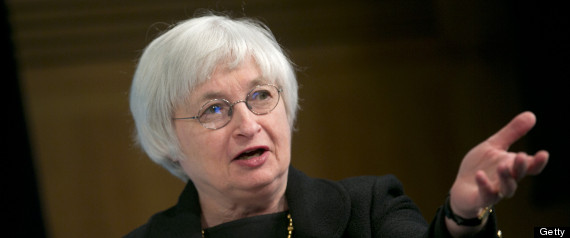In recent months, Janet Yellen has emerged as one of two top candidates to take control of the Federal Reserve when Ben Bernanke steps down. Though some say Yellen, the Fed's current vice chair, is the smartest person at the central bank, she's been subjected to a swath of criticism, which many of her defenders argue is tinged with sexism.
Those veiled swipes come in three forms:
1. She lacks "gravitas": As Yellen became a top contender to succeed Bernanke, many of her detractors argued that she’s too soft-spoken, isn’t assertive enough and lacks the “gravitas” necessary to carry the economy through another financial mess. As the Washington Post’s Ezra Klein notes, “what the complaints share is an implicit definition of leadership based on stereotypically male qualities.”
As anyone who has observed one of Bernanke's Fed press conferences can attest, he is also pretty soft-spoken and lacks charisma in the most traditional sense (Paul Giamatti’s portrayal of the Fed chair in the film “Too Big To Fail” notwithstanding). Despite being semi-quiet, Bernanke has managed to steer the Fed through one of the biggest economic downturns in the nation’s history.
2. She's too "dovish": Conservative critics have accused Yellen of being too “dovish,” favoring an approach to monetary policy that puts more focus on high levels of unemployment than high levels of inflation. While this assessment of Yellen is largely true, it’s also been true of Bernanke, a registered Republican, in the years following the crisis. To be sure, Bernanke hasn’t escaped scrutiny for his soft monetary policy either, but it also hasn’t been part of a larger conversation over his personality.
Others have said that if she became Fed chair, Yellen wouldn’t do enough to break up the big banks because her career trajectory indicates she’s more concerned with monetary policy than regulatory policy. While again this may be true, Yellen’s top rival Larry Summers is even less likely to hit at the big banks; Summers has been criticized for his role in Wall Street deregulation when he served as Treasury Secretary under President Clinton. Summers has also argued in the past that too-large banks aren't as much to blame for the financial crisis as many say.
3. The decision to pick Yellen would be "driven by gender": Many, including other central bankers, suggested that gender has become such a big issue in the future-of-the-fed debate that if Yellen is picked, it will only be because she’s a woman. Others have said she’ll be picked just because she isn’t Summers, a volatile figure in some circles.
But even Summers' supporters concede that Yellen is bright and qualified. In addition, she’s done the best job of anyone at the Fed of predicting the economy’s turbulent course over the past few years, according to the Wall Street Journal.
Original Article
Source: huffingtonpost.com
Author: Jillian Berman
Those veiled swipes come in three forms:
1. She lacks "gravitas": As Yellen became a top contender to succeed Bernanke, many of her detractors argued that she’s too soft-spoken, isn’t assertive enough and lacks the “gravitas” necessary to carry the economy through another financial mess. As the Washington Post’s Ezra Klein notes, “what the complaints share is an implicit definition of leadership based on stereotypically male qualities.”
As anyone who has observed one of Bernanke's Fed press conferences can attest, he is also pretty soft-spoken and lacks charisma in the most traditional sense (Paul Giamatti’s portrayal of the Fed chair in the film “Too Big To Fail” notwithstanding). Despite being semi-quiet, Bernanke has managed to steer the Fed through one of the biggest economic downturns in the nation’s history.
2. She's too "dovish": Conservative critics have accused Yellen of being too “dovish,” favoring an approach to monetary policy that puts more focus on high levels of unemployment than high levels of inflation. While this assessment of Yellen is largely true, it’s also been true of Bernanke, a registered Republican, in the years following the crisis. To be sure, Bernanke hasn’t escaped scrutiny for his soft monetary policy either, but it also hasn’t been part of a larger conversation over his personality.
Others have said that if she became Fed chair, Yellen wouldn’t do enough to break up the big banks because her career trajectory indicates she’s more concerned with monetary policy than regulatory policy. While again this may be true, Yellen’s top rival Larry Summers is even less likely to hit at the big banks; Summers has been criticized for his role in Wall Street deregulation when he served as Treasury Secretary under President Clinton. Summers has also argued in the past that too-large banks aren't as much to blame for the financial crisis as many say.
3. The decision to pick Yellen would be "driven by gender": Many, including other central bankers, suggested that gender has become such a big issue in the future-of-the-fed debate that if Yellen is picked, it will only be because she’s a woman. Others have said she’ll be picked just because she isn’t Summers, a volatile figure in some circles.
But even Summers' supporters concede that Yellen is bright and qualified. In addition, she’s done the best job of anyone at the Fed of predicting the economy’s turbulent course over the past few years, according to the Wall Street Journal.
Original Article
Source: huffingtonpost.com
Author: Jillian Berman

No comments:
Post a Comment